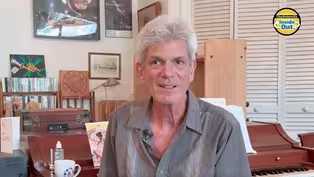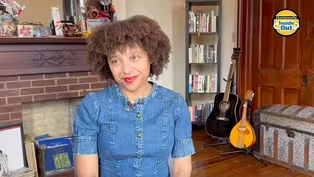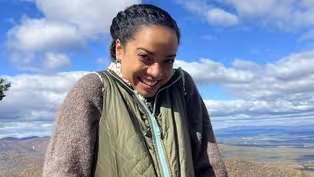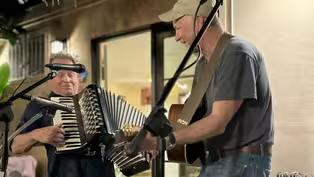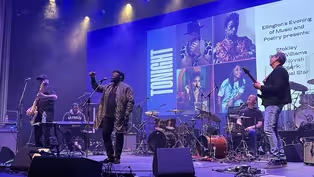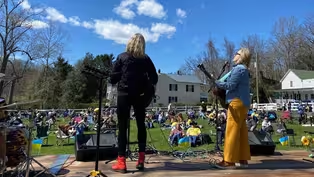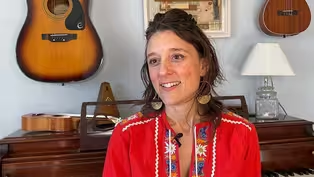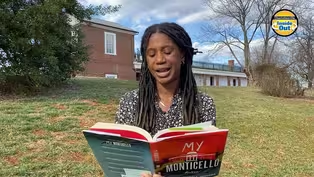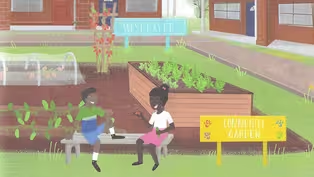Charlottesville Inside-Out
Trumpeter, composer and educator, John D’earth, talks about his passion for teaching
Clip: Season 14 | 6m 56sVideo has Closed Captions
Trumpeter, composer and educator, John D’earth, talks about his passion for teaching.
In this first segment of a two-part CVIO series, John D'earth — a widely known Charlottesville-based trumpeter, composer and educator — talks about his passion for teaching, his role as director of jazz performance at the University of Virginia and his future plans as he prepares to retire after teaching at the school for over 40 years.
Problems playing video? | Closed Captioning Feedback
Problems playing video? | Closed Captioning Feedback
Charlottesville Inside-Out is a local public television program presented by VPM
Charlottesville Inside-Out is a local series presented by VPM
Charlottesville Inside-Out
Trumpeter, composer and educator, John D’earth, talks about his passion for teaching
Clip: Season 14 | 6m 56sVideo has Closed Captions
In this first segment of a two-part CVIO series, John D'earth — a widely known Charlottesville-based trumpeter, composer and educator — talks about his passion for teaching, his role as director of jazz performance at the University of Virginia and his future plans as he prepares to retire after teaching at the school for over 40 years.
Problems playing video? | Closed Captioning Feedback
How to Watch Charlottesville Inside-Out
Charlottesville Inside-Out is available to stream on pbs.org and the free PBS App, available on iPhone, Apple TV, Android TV, Android smartphones, Amazon Fire TV, Amazon Fire Tablet, Roku, Samsung Smart TV, and Vizio.
Providing Support for PBS.org
Learn Moreabout PBS online sponsorship>>Hi, I'm John D'earth.
I'm a musician who lives in Charlottesville.
I play trumpet, I write music, I teach music.
I've lived here for about 43 years, and I feel like I just moved here.
I always say I have learned more from teaching than from any other thing, because it's easier for me and for many people to do for others what you are having a hard time doing for yourself, like learning something.
So I'm coming up with stuff for my students that turns out to be me teaching myself.
I have been teaching since I was 19 years old.
I love to teach, but I come from a family of teachers.
I have to say, my grandmother, my father's mother was a real little red schoolhouse teacher.
My father was a natural teacher who wasn't a professional teacher, but I learned more from him about music.
And he was not a musician, his ears were unbelievable.
But I had many great teachers and I copied the teachers.
Partly I love to teach or I'm good at teaching maybe because I am very understanding of having a hard time with certain things because I have a hard time with certain things.
So that helps teaching.
But also it's just a crystal in me I think that I just delight in seeing people take off with music because I feel like people are cheated of it because music is the most conservative art.
That's what Nietzsche said.
He said it's the most conservative art form.
It's the last art form to catch up with innovation because there are so many gatekeepers.
How many people do you know who thrive on listening to music and say they're not musical?
How can you not be musical if you love to listen to music?
But the message that they got is clear when you hear that.
Wrong message.
>>Part of your approach too, is this whole idea of letting people jump in the deep end.
>>I had that with my teachers.
That's a big part of studying with real jazz musicians.
And I was so lucky to meet real jazz musicians who really played jazz in the real world.
Made records in the real world, knew Charlie Parker, knew Dizzy Gillespie, played on the Stan Kenton Band, and the standard was very high.
So they would give you impossible things to do and then say, you're only doing 60% of what I'm asking you to do here, John.
I'll never forget when my teacher Boots said that to me.
I was just devastated.
He only spoke badly like that to me about twice, but it made an impact.
I think we're stingy with the information.
When we teach music, we withhold the means of production from the workers.
We need to share the means of production with the workers and tell kids right away, hey, somebody wrote this music.
You can write music.
Anybody can write music.
Let's write some music.
It puts it on a whole, it puts it in a different perspective to think that you're gonna create.
You give a kid a sheet of paper.
You know that joke I like so much about the mother and the little girl says, where do you go to work every day?
I go up on the hill and teach the university students how to paint and draw.
And the little girl says, what you mean they forgot?
Well, we do that in the UVA Jazz Ensemble.
We step out of the comfort zone because we have all semester to rehearse.
So I give 'em stuff that's really hard.
Well, my role at UVA is to be the Director of Jazz Performance, and I have given myself a virtual trophy for never having called a meeting of the jazz faculty at UVA, because it's all of us who are friends who play together all the time, and we know intuitively what we need to do for our students.
And that's a very special thing at UVA because we teach very gifted, brilliant people who probably aren't gonna play music for a living, who really want music in their lives.
And we want them to keep that for the rest of their lives.
So that's the goal.
And learning to respect a person like that and not expect that they're going to pursue their music like a conservatory student is something we've all had to learn and address in ourselves.
The thing that I'm proud of as a private teacher with people who are serious is they don't sound the same.
They end up finding their own thing.
And that is one of the first rules of jazz.
There's two rules, basically.
Master the vocabulary and be yourself.
Everyone else is taken, whoever said that.
How do my students perceive me?
People don't know how to take me sometimes.
So that's interesting working with that.
I think they go through a progression with me where they, hopefully, this is what I hope.
First of all, I think they're usually intimidated at first because it's just somebody who's over the top in some way, and they think that I have this reputation and blah, blah, blah.
I teach at UVA, made a record, whatever the heck.
So they start with that.
Then they realize, oh, this guy's, he's not that intimidating.
In fact, he's funny.
I think they think that I'm really serious about the very, very basic things of playing.
And they get that and they take it.
And the ones who are gonna play run with that, and then they come back to me and say, you're not serious enough.
I think they think that I've got their backs.
I hope they think that.
I'm not competing with them.
I'm retiring from UVA.
What am I gonna do with that extra time?
That is the million dollar question that I'm asking myself.
And I'm really trying to sort of bootcamp my way towards that with a little more personal discipline and not just have to show up because you're scheduled to be there.
That's the hope.
But I also hope to get very mobile in a van and drive all over the continent and visit cities, visit people, friends, play music.
This thing, try to figure out a way to do music in a meaningful way that doesn't involve a lot of hype and doesn't involve a lot of self-promotion, because I'm terrible at that.
I'm gonna keep playing gigs and I'll keep composing, I hope, and actually a lot more composition.
So yeah, I'm hoping it'll just unfold into much more music all the time.
(upbeat jazz music) (band member laughing) (upbeat jazz music) (gentle music)
Trumpeter, composer and educator, John D’earth, talks about his passion for teaching
Video has Closed Captions
Clip: S14 | 6m 56s | Trumpeter, composer and educator, John D’earth, talks about his passion for teaching. (6m 56s)
Meet Virginia Center for the Book director Kalela Williams
Video has Closed Captions
Clip: S14 | 2m 20s | Virginia Center for the Book director, Kalela Williams, talks about VCB’s programming. (2m 20s)
Video has Closed Captions
Clip: S14 | 6m 12s | Jessica Harris founded a nonprofit youth theatre at age 16. Find out what she's doing now! (6m 12s)
Musical group Scuffletown celebrates 25th anniversary
Video has Closed Captions
Clip: S14 | 11m 6s | Founding members of Scuffletown share the scoop on performing together for 25 years. (11m 6s)
Lester Jackson signs streaming licensing agreement with UVA
Video has Closed Captions
Clip: S14 | 10m 13s | Lester Jackson, aka Nathaniel Star, talks about his music and licensing agreement with UVA (10m 13s)
Concert raises $15,000 to support Ukraine relief efforts
Video has Closed Captions
Clip: S14 | 4m 41s | Batesville community raises $15,000 to support Ukraine relief efforts. (4m 41s)
Catching up with songwriter and musician Suz Slezak
Video has Closed Captions
Clip: S14 | 5m 57s | Catch up with Suz Slezak, co-founder of David Wax Museum Band. (5m 57s)
A Visit with Author Jocelyn Nicole Johnson
Video has Closed Captions
Clip: S14 | 4m 6s | Hear from Jocelyn Nicole Johnson, as she talks about the inspiration behind her book. (4m 6s)
The story behind the children’s book "A Promise to Grow"
Video has Closed Captions
Clip: S14 | 4m 44s | Hear the story behind a children’s book set in Charlottesville’s Westhaven community. (4m 44s)
Providing Support for PBS.org
Learn Moreabout PBS online sponsorshipSupport for PBS provided by:
Charlottesville Inside-Out is a local public television program presented by VPM
Charlottesville Inside-Out is a local series presented by VPM
